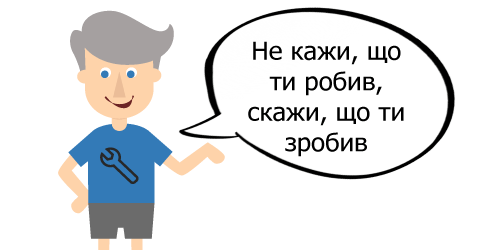In this lesson we will see that imperfective and perfective verb forms in Ukrainian not always have the same tense in English. Let’s have a look at the differences!

Useful phrase in Ukrainian
Listen and repeat the following sentence:
Не кажи́, що ти роби́в, скажи́, що ти зроби́в.
Don’t say what you were doing, but say what you finished doing.
The verbal aspect
Attention: In this lesson you will learn something very important, the verbal aspect.
In Ukrainian there are two kinds of verbs:
- verbs which mean “to be doing something” (imperfective verbs)
- verbs which mean “to have done something / to have finished doing something” (perfective verbs)
The concept of “verbal aspect” doesn’t exist in English, but it exists in other Slavonic languages like Polish and Russian.

Ukrainian vocabulary
Read, listen and repeat the basic vocabulary of this lesson.
Втоми́вся (masc.) / втоми́лася (fem.)
to be tired
весь (masc.) / вся (fem.) / все (neuter)
all, every, everything
рома́н
novel
вече́ря
dinner
іме́йл
дім / вдо́ма
home / at home
улю́блений
favourite
смакота́
yummy, delicious
як шко́да!
what a pity!
до́вго
long, for a long time
зазвича́й
usually
по́ки
while
про
about
Imperfective and perfective verbs
In this lesson you will learn that Ukrainian verbs come in couples.
Each couple of Ukrainian verbs (usually) has only one English equivalent.
In the grammar section at the end of this lesson, you have an explanation on this topic.
Ukrainian (imperfective verb / perfective verb)
English
роби́ти / зроби́ти
to do
чита́ти / прочита́ти
to read
диви́тись / подиви́тись
to watch, to look
писа́ти / написа́ти
to write
готува́ти / приготува́ти
to cook
каза́ти / розказа́ти
to tell
подо́батися / сподо́батися
to like, to please
ду́мати / поду́мати
to think

Dialogues
With extra help for verbs!
Now you are going to see a series of short dialogues which include perfective and imperfective verbs. In the grammar section (after the dialogues) you will learn more about these verbs.
We are going to help you:
- Perfective verbs will be highlighted like this.
- Imperfective verbs will be highlighted like this.
Dialogue 1
Як я втоми́лася! Вчо́ра я працюва́ла весь день.
I’m so tired! Yesterday I worked the whole day.
Яка́ га́рна дíвчинка! Ти все зроби́ла?
Good girl! Did you finish (lit. do) everything?
Ні, я працюва́ла до́вго, але́ зроби́ла не все.
No, I worked long, but I didn’t finish everything.
Як шко́да! А я вчо́ра не працюва́в. Я чита́в ціка́вий рома́н.
What a pity! I didn’t actually work yesterday. I was reading an interesting novel.
Ти прочита́в його́ весь?
Did you read it till the end?
Ні, я чита́в його́ весь ра́нок, але́ не прочита́в його́.
No, I was reading the whole morning, but I didn’t finish (reading) it.
А що ти роби́в весь ве́чір?
And what were you doing the whole evening?
Я диви́вся телевíзор. Та зна́єш що? Я подиви́вся твій улю́блений фільм.
I was watching television. And you know what? I watched your favourite movie.
Ду́же до́бре!
Well done!
Dialogue 2
Ви були́ вчо́ра у кіно́?
Were you at the cinema yesterday?
Ні, ми були́ вдо́ма. Я до́вго писа́ла іме́йл.
No. We were at home. I spent a long time writing an email.
Але́ ж ти його́ написа́ла, чи не так?
But you finished it, right?
Так, я написа́ла його. Це був ду́же важли́вий іме́йл.
Yes, I finished (writing) it. It was a very important email.
А що роби́в Майкл коли́ ти писа́ла іме́йл?
And what was Michael doing while you were writing the email?
Він готува́в. Вчо́ра він приготува́в ду́же смачну́ вече́рю.
He was cooking. Yesterday he made a very delicious dinner.
Dialogue 3
Що ти ро́биш?
What are you doing?
Я ду́маю про нови́й фільм. Зазвича́й менí подо́баються коме́дії, але́ цей фільм менí не сподо́бався.
I’m thinking about the new movie. Usually I like comedies (lit. comedies please me) , but I didn’t like this movie.
А менí сподо́бався фільм. Менí подо́баються ціка́ві фільми. Я подиви́лася його́ вчо́ра та поду́мала, що це га́рний фільм.
I liked it, actually. I usually like interesting movies. I watched it yesterday and thought that it was a good movie.
А я гада́в, що тобí тако́ж не подо́баються коме́дії.
I thought you also didn’t like comedies.
Зазвича́й вони́ менí не подо́баються, але́ цей фільм сподо́бався.
Usually I don’t like them, but this movie I liked.

Ukrainian grammar
Read the following grammar explanations for this lesson:
The aspect: imperfective and perfective verbs
WHAT IS THE “VERBAL ASPECT”?
In this lesson we have seen something VERY IMPORTANT regarding Ukrainian, which we will now explain in a way that is easy to understand:
In English we can talk about imperfect actions (ongoing or unfinished actions) and perfect actions (= finished actions):
- Imperfect actions: Yesterday Anna was reading when I came home. This morning I was cooking when you called me.
- Perfect actions: Yesterday Anna read a book. This morning I have cooked soup.
The “verbal aspect” is this comparison between “what is finished” and “what is happening”. Thus, we will have:
- Imperfective aspect: when we express an imperfective (unfinished) action.
- Perfective aspect: when we express a perfect (finished) action.
What is an imperfective and a perfective verb?
In English, the same verb (“to cook”) is used to express both an ongoing action (I was cooking, I have been cooking) and a finished action (I cooked, I have cooked). That is why, when learning English, we don’t talk about “verbal aspect”.
In Ukrainian, the contrast between imperfect and perfect is expressed with two different verbs:
- The imperfective verbs are those which only express imperfect actions (= ongoing and unfinished actions).
- The perfective verbs are those which only express perfect actions (= finished actions).
So when learning Ukrainian we MUST take into account the concept of “verbal aspect”.
EXAMPLES
| Imperfective: when we talk about an ongoing/unfinished action | готува́ти / чита́ти | to cook / to read |
| Perfective: when we talk about an already finished action | приготува́ти / прочита́ти | to cook / to read |
When you learn a new verb, try to memorize the pair imperfective / perfective. In the vocabulary section, at the beginning of this lesson, we show you some pairs of verbs, so you start getting used to this way of learning them.
When do we use an imperfective verb?
1. To explain what we usually do, repeated actions, habits, etc…
…in the present
| Я чита́ю ко́жен день. | I read every day. |
| Він готу́є ду́же до́бре. | He cooks very well. |
| Ми ди́вимось тíльки украї́нські фíльми. | We only watch Ukrainian movies. |
…or in the past
| Ранíшен я чита́в ко́жен день | Before I used to read every day. |
| Коли́ я жив в Украї́ні, я ча́сто готува́в суп. | When I was living in Ukraine, I would often cook soup. |
2. To explain a process while it’s happening…
….in the present (what are we doing?)
| Я чита́ю | I am reading |
| Він ро́бить щось | He is doing something |
| Ми готу́ємо вече́рю | We are cooking dinner |
…or in the past: (what were we doing?)
| Я диви́вся телевíзор, коли́… | I was watching TV, when… |
| Вчо́ра я чита́в рома́н. | yesterday I was reading a novel |
When do we use a perfective verb?
To explain a finished action (in Ukrainian it is always in the past).
| Я прочита́в рома́н | I have read the novel / I finished reading the novel. |
| Він приготува́в вече́рю. | He has cooked dinner / He finished cooking dinner. |
Perfective verbs don’t exist in the present: when you finish something, it is already in the past (even if only one second in the past).
NOTE: The future of perfective and imperfective verbs will be studied in lesson 13 of this course.

Test
Check if you know this lesson:



